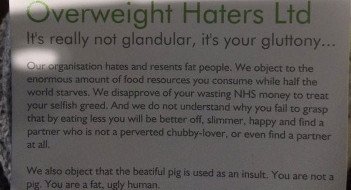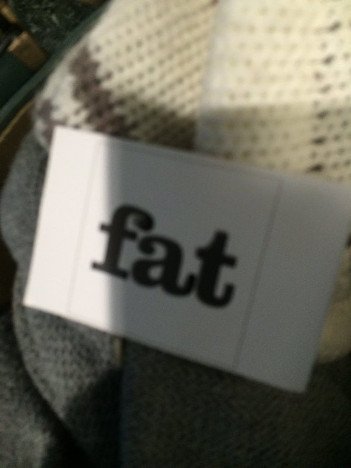Let’s Just Stop Body Shaming Each Other
A few weeks ago, a group of seemingly innocuous men got on some Tubes and quietly harassed some Londoners about their weight. They proclaimed themselves ‘Overweight Haters Ltd’ – a title which they had printed on an unknown amount of leaflets and cards they distributed to unsuspecting members of the public. The concept behind the cards was pretty simple; blame fat people for wasting NHS funding, suggest that if they eat less they’ll be “better off,” and ultimately, make everybody feel a little bit shit about themselves.

Contrary to whatever Overweight Haters Ltd probably thought they were going to achieve, the majority of the British public thankfully did not seem to agree with their abusive shaming display. NHS worker Kara Florish took to social media to shame those who had presented her with a card on the Underground, condemning their actions as “hateful and cowardly.” One Twitter user declared that if she was presented with a card she would eat it. Another suggested that anybody who attempted to give somebody such a leaflet should be smacked in the face. Following multiple complaints throughout the day, the British Transport Police began urging anyone else being harassed to report the incident, and stated that “this sad and unpleasant form of antisocial behaviour will not be tolerated.”
While the adverse reaction to Overweight Haters’ insultingly intrusive campaign was both warranted and laudable (it’s always nice to see a group of strangers come together to fight in an inexplicable, anonymous force of evil via the internet), it also proved that crap like this happens all the time.

The cards distributed on the Underground may be primarily focused on shame, hatred, and proving that whoever printed them are basically a group of assholes, but the cards also tried to justify their cruelness by feigning concern for the state of Britain’s National Health Service. We all know that fat shamers aren’t just these strange men hopping on and off Tubes to ruin somebody’s day; they exist in droves, but they do generally seem to have one thing in common – they like to pretend that they care.
“We object to the enormous amount of food resources you consume while half the world starves,” suggests that this isn’t just about making you feel ashamed. It’s about how you can change for the better, how you can help, why we’re telling you these things because we care so much about the other good people of this earth.
But, of course, they don’t. It’s probably not likely that the same group of fellas were handing out similar leaflets to smokers, alcoholics, or anybody recently afflicted by an accidental injury that left them, or is likely to leave them, in hospital. All of those people are entitled to avail of NHS funding too, but they were not the targets of the group’s cruel joke. This wasn’t a genuine concern for the health of the British public. It was just fat shaming.[pullquote]This wasn’t a genuine concern for the health of the British public. It was just fat shaming.[/pullquote]
As a whole, body shaming is defined as “inappropriate negative statements and attitudes toward another person’s weight or size.” It is predominantly understood to be directed at those who might be overweight, or individuals whose bodies do not conform to what the media, celebrity culture, and general society tend to deem ‘beautiful.’ Some nice, sound, and influential humans like Amy Schumer and Ariana Grande have called out those who engage in body shaming in attempts to pit women against each other, defining them purely by the way they look.
Schumer’s “Stay on or get off,” response to Hollywood ‘reporter’ Jeff Wells’ ‘review’ of Trainwreck in which he declared that there was “no way she’d be an object of heated romantic interest in the real world,” went viral within a few hours of her tweeting it. Primarily because Jeff Wells is awful, but also thanks to the recent widespread promotion of ‘body positivity.’
I am a size 6 and have no plans of changing. This is it. Stay on or get off. Kisses! pic.twitter.com/6IsEfFOwAD
— Amy Schumer (@amyschumer) February 12, 2015
Have a scroll through the #bodyposi Twitter tag and you’ll see an abundance of people (mostly women) sharing pictures of themselves to prove that they are in fact proud of how they look. The tag is nice – it makes people feel good about themselves without the intention of shaming anybody else. Some users’ photos get hundreds of retweets, thus promoting a positive self-image, and probably making somebody’s day in the process.
But then you have those few people who still think that body positivity is nothing more than an endorsement of an unhealthy lifestyle, that plus size models like Tess Holliday and Ashley Graham are (somehow) walking advertisements for obesity, and that nobody should ever dare to leave their house with a smile on their face if their BMI rests a bit above the norm.

Evidently, those are the members of Overweight Haters Ltd, and people like good ol’ Katie Hopkins whose Twitter bio still proudly proclaims that she “gained and lost 3.5 stones proving fat people are lazy.” The last time I checked, you couldn’t actually determine a person’s medical history just by looking at them. And you definitely cannot be sure that somebody is unhealthy because they weigh a little bit more than what you deem ‘acceptable.’
All of this isn’t to say that other forms of body shaming do not exist, because they do. Just look at the reaction Cheryl Fernandez-Versini received last summer when she showed up to the first round of X-Factor auditions. Insults like “too skinny,” “skeleton,” and “bag of bones” were thrown around for weeks, leaving the singer no other option but to try and defend her appearance to the public. Meghan Trainor also received a significant amount of backlash following the release of All About That Bass – a song that both celebrates curvy women (kind of), while also telling “skinny bitches” to back off, because men “like a little more booty to hold at night.”
However, while skinny shaming exists alongside fat shaming in this unsavoury sphere of complaining about other body types for no good reason, many people remain convinced that the two acts of shaming are not the same. A few years ago, Everyday Feminism’s Melissa A. Fabello wrote an article in which she stated that “You might hate your body, but society doesn’t. That’s thin privilege.” The piece recognises that offensive comments regarding thin people’s weight do exist, and that thin people can also have negative views of their own bodies, but Fabello refused to entertain the notion that being thin is not more socially acceptable than being fat.
The argument sparked a lot of debate, but at the crux of the matter lay the simple fact that almost everybody could agree on – body shaming is bad, so we should stop doing it. Making people feel bad about themselves for being slim, making ‘skinny jokes,’ and handing out Underweight Haters Ltd cards on packed Tubes may not be common occurrences, but that doesn’t mean that they couldn’t be. And it definitely doesn’t mean that you’d be any less of an asshole for doing it.[pullquote]The last time I checked, you couldn’t actually determine a person’s medical history just by looking at them.[/pullquote]
Publically humiliating somebody on the Underground in a convoluted attempt to save the NHS won’t make you a hero. And neither will your expression of false concern for a celebrity’s health following their recent weight loss or gain in the comments section of that Daily Mail article. If you’re worried about someone’s health, go ask them if they’re alright. Let’s stop making people feel like shit.
Images via twitter.com/@kflorish

